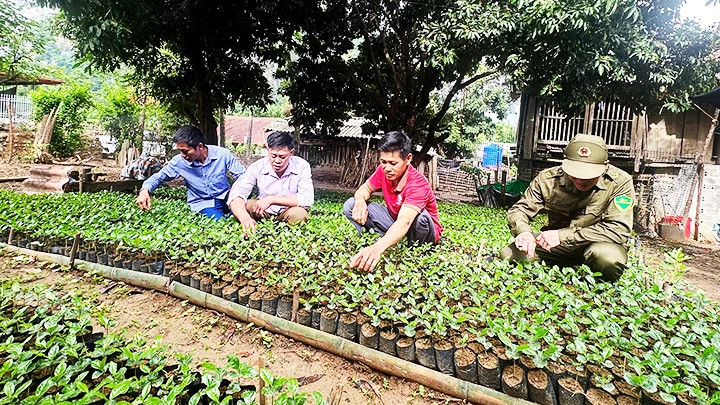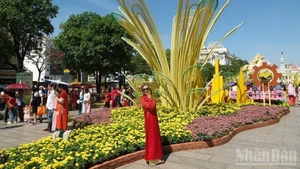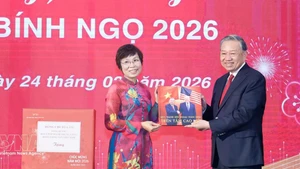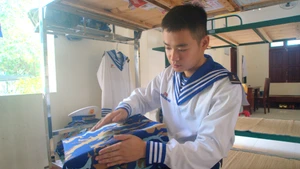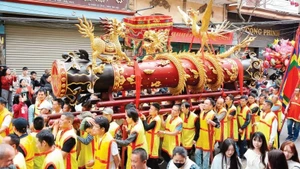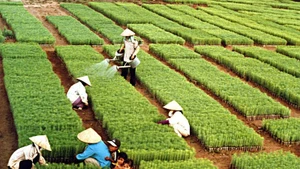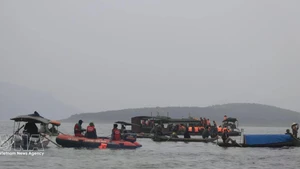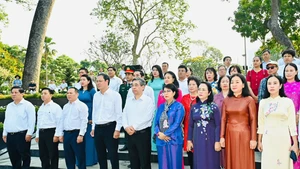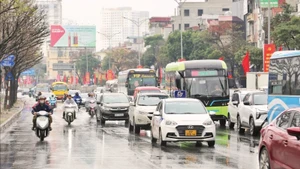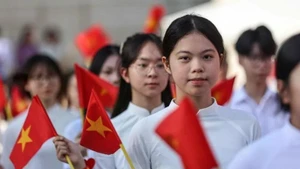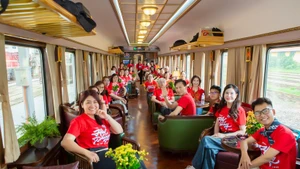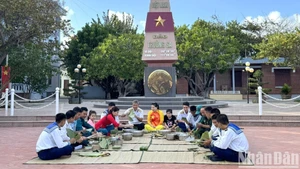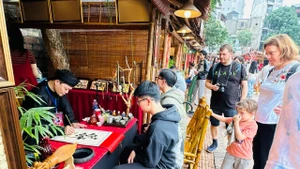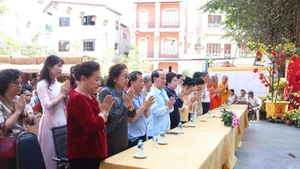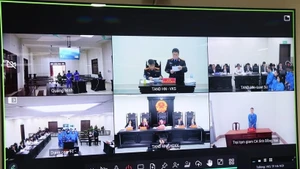Thanks to Dia’s guidance, residents in Pha Nang Hamlet, Quai Nua Commune, Tuan Giao District have successfully propagated nearly 100,000 coffee seedlings in preparation for the planting season 2025.
From the story “awaiting consideration...”
Years have passed, and after many ablaze summers with red flamboyant flowers, student Sung A Dia has become a mature and seasoned man. In his family, Dia is the main breadwinner, the one his mother, wife and two young children rely on.
For Pha Din Cooperative, Dia also plays a leading role, planning and assigning work to 15 members and ensuring everyone has employment and income. Apart from that, Dia acts as a consultant, guiding Hmong people in Hua Sa A, Hua Sa B, Toa Tinh, Che A hamlets on selecting coffee beans for seed propagation and caring for seedlings. Each harvest season, he travels around Toa Tinh Commune and neighbouring Quai Nua, Quai Cang and Quai To Communes to purchase coffee beans from local farmers. There is so much work it’s impossible to list it all, but as Dia jokingly puts it, “If it’s related to coffee or needed by the local people, I’m always ready so they can feel at ease growing and tending coffee trees.”
Talking to Dia, one senses his agility and clear planning for each task, however, I couldn’t help but wonder why he didn’t take a job immediately after graduating from such a prestigious university but chose to start atop the fog-shrouded Pha Din Pass. As if reading my mind, Dia glanced down, counted on his fingers, and said: “This summer marks 13 years since I earned my degree in Finance and Banking from the National Economics University. It was a dream degree for me and my whole family. But when I submitted my application, from commune to district and then to the province, all I received were promises: ‘awaiting consideration, we’ll contact you when there’s a vacancy.’ After nearly two years with no response, I decided to talk with my parents and borrow bank capital to start a small business at home.”
To the question “What is a cooperative?”
With his parents’ support, Dia invested the entire bank loan into purchasing coffee beans from local farmers, hiring transport to take them to buyers in Son La Province. Season after season, not only did people in Hua Sa B trust Dia as a reliable buyer, but Hmong ethnic people from surrounding areas also came to him. Regardless of quantity, whenever someone had ripe beans to sell, Dia would go directly to their house or farm to help them save the trouble of travelling. Through years of hard work and saving, he eventually bought a small truck to transport coffee to Son La Province more conveniently and increase his income.
At the end of 2023, when Tuan Giao district announced its policy to expand coffee cultivation and identified coffee as one of two key crops in agricultural restructuring, Dia proactively contacted Dien Bien Province’s Department of Agriculture and Rural Development to request certification for elite mother trees in his family’s plantation. He also spent time visiting households in Hua Sa B Hamlet to encourage them to form a cooperative – a legitimate organisation qualified to produce and supply coffee beans and seedlings.
Despite their trust in Dia, many local farmers were hesitant about the cooperative idea, asking, “What is a cooperative?” and “Why sell coffee through a cooperative instead of selling directly to Dia like before?” Due to such concerns, Pha Din Cooperative was officially launched in early 2024 with only seven members from Hua Sa B hamlet, and Dia was appointed as the cooperative’s chairman.
With support from staff at Tuan Giao District’s Agricultural Service Centre, the newly formed Pha Din Cooperative soon received an order to supply coffee seeds for propagation. This brought great joy to Dia and his members.
“It was only after we completed delivery of over 3.3 tonnes of coffee seeds to the centre at the end of 2024 that I finally breathed a sigh of relief. Right then, I knew we had to focus on advanced technical guidance from seed selection and planting techniques to proper care and harvesting of coffee. The future of Pha Din Cooperative and the local farmers in Hua Sa B Hamlet must not only be about expanding coffee cultivation area, but also about improving product quality to ensure coffee has its brand and place in the market,” Dia said.
As the head of Pha Din Cooperative, headquartered in Hua Sa B hamlet, Toa Tinh Commune, Tuan Giao District, Dia frequently receives calls from Hmong ethnic people in Quai Cang, Quai Nua and Quai To communes whenever the seasons change, asking how to detect and treat plant diseases.
“Dia understands the trees, even their diseases. If we ask him, he knows how to treat them,” said Luong Van Thong, Head of Pha Nang Hamlet in Quai Nua Commune, Tuan Giao District.
A teacher named Sung A Dia
Dia envisioned launching the cooperative, more than a year later, the name “Pha Din Cooperative” has become familiar to nearly every coffee grower in Tuan Giao District and even in many communes of Dien Bien Dong District. In addition to purchasing and supplying seeds, Chairman Dia is often sought after for his technical knowledge, from soaking and sprouting to selecting healthy seedlings for potting.
Trusting Dia’s dedication and practical approach, at the end of 2024, as Tuan Giao district’s Agricultural Service Centre began distributing seeds to registered households, they also asked Dia to support their technicians by visiting hamlets, offering guidance and demonstrations. Using a method combining theory and hands-on training at nurseries, with Dia also serving as a Hmong interpreter, the Hmong people in remote communes such as Na Tong and Pu Xi were able to easily follow the instructions. This significantly eased the coffee propagation and planting process in Tuan Giao District.
“In 2025, the district plans to grow about 2,300 hectares of coffee using potted seedlings, but the current estimate has risen to 3,000 hectares due to strong participation from the people. This success is largely thanks to the tireless efforts of Sung A Dia, Chairman of Pha Din Cooperative, who has voluntarily accompanied our technical staff throughout the programme without asking for any remuneration,” Nguyen Thi Thanh Nga, Director of Tuan Giao District’s Agricultural Service Centre, said.
To the Hmong people in Tuan Giao District and Pu Nhi Commune, Dien Bien Dong District, Sung A Dia is not only a companion but also a teacher, who did not mind the hardships, quietly overcame the sun and wind on each mountain pass, travelling to every farm and hillside to teach them how to dig planting holes, mix fertiliser, and sprout coffee beans.
